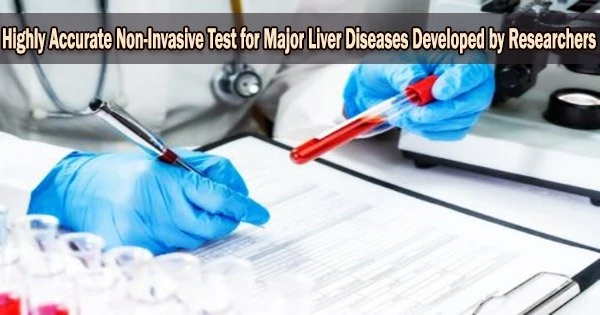A liquid biopsy is a non-invasive method for detecting and diagnosing diseases using a sample of a patient’s blood or other body fluid. It has the potential to revolutionize healthcare by providing a simple and less expensive way to detect and monitor diseases.
To screen for severe liver illnesses, researchers have developed a liquid biopsy test that makes use of two circulating proteins. The test was discovered to be very precise, sensitive, and specific for both liver fibrosis and NASH. For the first time, a non-invasive test will make it possible to stage both diseases without having to perform another invasive liver biopsy.
Non-alcoholic steato-hepatitis (NASH) is the most severe form of non-alcoholic fatty liver disease (NAFLD) and is diagnosed in approximately 60% of NAFLD patients. NASH increases the chance of developing into more severe liver conditions such liver cancer, cirrhosis, and liver fibrosis.
NAFLD affects approximately 52 million people in Europe and 64 million people in the US, costing $138 billion annually to the European and US healthcare systems combined.
Currently, the only way to diagnose NASH is through an invasive liver biopsy, which is costly, fraught with side effects, and complicated. Due to their limited sensitivity and specificity, blood tests (also known as liquid biopsies) are equally unreliable for diagnosing the disorders. Current blood tests are also unable to reliably predict NASH and fibrosis staging.
Professor Geltrude Mingrone, from King’s College London and Catholic University of Rome, Italy, looked to find a more accurate liquid biopsy test.
This blood test will allow to define the real prevalence of NASH in large and small populations, including children and adolescents, avoiding the need for invasive liver biopsy. Importantly, it will also allow to monitor the efficacy of NASH treatments over time, reducing screen failures and helping generate better drugs.
Professor Geltrude Mingrone
The paper, published in leading journal Gut, identified two protein biomarkers, PLIN2 and RAB14, that were used as part of an algorithm to identify people with NASH and/or liver fibrosis. The ability for these proteins to detect NASH was tested in cohorts of people with either biopsy-confirmed NASH or liver fibrosis.
The algorithms, which used A.I., gave impressive results, including a sensitivity of 88-95%, a specificity of 90%-100%, and an overall accuracy of 92-93% for NASH. For fibrosis, they were even better, with a sensitivity of 99%-100%, specificity of 90%-96%, and accuracy of 98%-99%.
It is now possible to forecast the stages of the diseases without invasive liver biopsy, and it is far more accurate than all other indicators that are now accessible.
Professor Geltrude Mingrone, from King’s College London, said: “This blood test will allow to define the real prevalence of NASH in large and small populations, including children and adolescents, avoiding the need for invasive liver biopsy. Importantly, it will also allow to monitor the efficacy of NASH treatments over time, reducing screen failures and helping generate better drugs.”
These results show that the PLIN2/RAB14-based liquid biopsy can provide rapid and cost-effective testing to combat the growing epidemic of NASH and liver fibrosis. This will be a crucial tool for identifying and tracking liver disease instances, allowing patients to start treatment sooner.
The testing, according to the authors, will enhance researchers’ ability to study NASH and liver fibrosis in the general population, including disease development, and record the results of treatment, including lifestyle, surgical, and pharmaceutical interventions.
No NASH drug has been approved by the FDA or EMA due to the lack of an accurate, reliable, and non-invasive test. Currently, 65-73% of patients who enroll in clinical trials for treatments associated to NASH are discovered to be ineligible for the trial due to screen failure.
The test created in partnership with Metadeq Corp. is anticipated to drastically lower screen failures in clinical trials and increase the likelihood that new, life-saving medications will be approved for sale.





